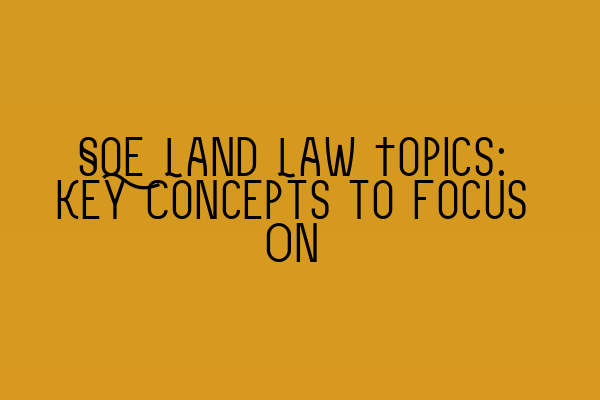SQE Land Law Topics: Key Concepts to Focus On
As an aspiring solicitor specializing in property law, it is essential to have a strong understanding of land law. The Solicitors Qualifying Examination (SQE) is a crucial step on your journey to becoming a qualified solicitor, and a solid grasp of the key concepts in land law is vital to your success in this exam.
In this blog post, we will explore the essential land law topics that you should focus on during your SQE preparation. By familiarizing yourself with these key concepts, you can enhance your knowledge, improve your chances of success in the exam, and excel in your future career as a property law solicitor.
1. Freehold and Leasehold
One of the fundamental distinctions in land law is between freehold and leasehold interests. Freehold ownership grants the owner absolute rights over the land, while leasehold ownership involves a lease agreement with specific terms and conditions. Understanding the differences between these two types of ownership is crucial, as they have significant implications for property transactions and legal rights.
For a detailed understanding of freehold and leasehold, check out our article on SQE 1 Practice Exam Questions.
2. Registered and Unregistered Land
In land law, land can either be registered or unregistered. Registered land is recorded in the Land Registry, providing a higher level of protection and certainty in land ownership. On the other hand, unregistered land lacks the same level of documentary evidence and requires additional investigation to establish ownership. Understanding the implications of registered and unregistered land is crucial for advising clients and participating in property transactions.
For a comprehensive guide on registered and unregistered land, refer to our article on SQE 1 Practice Mocks FLK1 FLK2.
3. Easements and Covenants
Easements and covenants are legal rights and obligations that can impact land ownership and usage. Easements grant specific rights to individuals over another person’s land, such as a right of way or a right to access utilities. Covenants, on the other hand, impose obligations on landowners, such as restrictions on usage or maintenance responsibilities. Understanding the nature and implications of easements and covenants is essential for advising clients on property transactions and resolving disputes.
For a more in-depth exploration of easements and covenants, our article on SQE 2 Preparation Courses offers valuable insights.
4. Mortgages and Charges
Mortgages and charges are legal mechanisms used to secure loans against property. A mortgage grants a lender an interest in the property as security for the loan, while a charge creates a similar security interest without transferring ownership. Understanding the intricacies of mortgages and charges is essential for advising clients, participating in property financing transactions, and dealing with potential defaults or foreclosures.
If you want to dive deeper into the world of mortgages and charges, our article on SQE 1 Preparation Courses will provide you with valuable insights.
5. Adverse Possession
Adverse possession refers to the legal principle that allows a person to acquire ownership of land by occupying it for a specified period, without the consent or permission of the legal owner. This concept has significant implications for property disputes and legal rights. Understanding the requirements, limitations, and implications of adverse possession is crucial for advising clients and resolving related disputes.
For more information on adverse possession and its applications, our article on SRA SQE Exam Dates will provide you with the necessary guidance.
Conclusion
As an aspiring property law solicitor, a strong understanding of land law concepts is vital for your success in the SQE examination and your future legal career. By focusing on the key topics discussed in this article, including freehold and leasehold, registered and unregistered land, easements and covenants, mortgages and charges, and adverse possession, you can build a solid foundation of knowledge in land law.
Remember to consistently review and apply these concepts in your study and practice, as a thorough understanding of land law will not only help you excel in the SQE examination but also serve as a valuable asset throughout your legal career.
